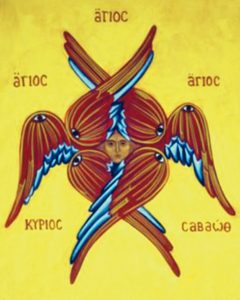Lord God of hosts
Near the end of the first Century Saint Clement, the Bishop of Rome, wrote to the Christians of Corinth. His long letter is one the oldest Christian writings outside the Scriptures. He comments:
“For Scripture says: Ten thousand times ten thousand stood by him, and thousands of thousands served him, and they cried out: “Holy, holy, holy is the Lord Sabaoth [Hagios, hagios, hagios kyrios sabaoth]; all creation is full of his glory.” Let us also, then, being gathered together in harmony with intentness of heart, cry out to him earnestly, with one mouth, so that we may come to share in his great and glorious promises. (1Clement 34:6-7)
So, around 100 AD the Christians of Rome were praying “Holy, holy, holy is the Lord Sabaoth” at least in their private prayer and possibly in the liturgy. The line comes from a vision of the prophet Isaiah:
“ I saw the Lord seated on a high and lofty throne; his train filled the sanctuary. Above him stood seraphs, each one with six wings: two to cover its face, two to cover its feet and two for flying; and they were shouting these words to each other: “Holy, holy, holy, is Yahweh Sabaoth. His glory fills the whole earth.” The door-posts shook at the sound of their shouting, and the Temple was full of smoke. (NJB Isaiah 6: 1b-4 )
Since the angels in heaven praise God with this phrase, it was picked up in both Jewish and Christian worship. In the Jewish liturgy it is said by the congregation as part of a prayer called Kedusha while the cantor recites the Eighteen Benedictions:
Kadosh Kadosh Kadosh Adonai Tz’vaot
Melo Kol Haaretz Kevodo.
“Holy, Holy, Holy, the Lord of Hosts,
The entire world is filled with His Glory”
The Book of Revelation also alludes to the Isaiah text:
Each of the four living creatures had six wings and was studded with eyes all the way round as well as the inside; and day and night they never stopped singing:
“Holy, Holy, Holy
is the Lord God, the Almighty;
who was, and is and is to come.”
(NJB Rev 4:8)
The Hebrew of the Isaiah text has a compound name of God “Yahweh Sabaoth”. This is used some 279 times in the Old Testament. Sabaoth (or Tz’vaot) is best explained by 1Samuel 17:45b “I come to you in the name of Yahweh Sabaoth, God of the armies of Israel, whom you have challenged.” In the Isaiah text it appears to be the armies of angels, rather than the armies of Israel who display the might of God. So the “hosts” are the heavenly host of angels. ‘Host’ means ‘a large number of people or things’ or ‘an army’. It can also be taken, in this context, to be the large number of worshippers of God. The Jews did not pronounce the sacred name of God, hence in the Jewish liturgy “Yahweh” is replaced by “Adonai” or “Lord”. The Septuagint translated “Yahweh Sabaoth” as “Kyrie Sabaoth.” Similarly the Book of Revelation uses “Lord God, the Almighty”.
Christians reading Isaiah saw, in this angelic prayer, a foreshadowing of the doctrine of the Trinity; the “Holy” being addressed to each of the three divine persons, equal praise and honour being shown to each. The Book of Revelation linked the triple “Holy” to the “was, and is and is to come” which associates it with the triumphal coming of Christ. The Liturgy extends this connection by combining the Isaiah text with Matthew 21:9 describing Jesus’ triumphal entry into Jerusalem:
The crowds who went in front of him and those who followed were all shouting
Hosanna to the son of David!
Blessed is he who is coming in the name
of the Lord!
Hosanna in the highest heavens!
So these scriptural texts are behind the ancient prayer that follows the preface in the Mass:
Sanctus, Sanctus, Sanctus
Dominus Deus Sabaoth.
Pleni sunt caeli et terra gloria tua.
Hosanna in excelsis.
Benedictus qui venit in nomine Domini.
Hosanna in excelsis.
The Sanctus does not exactly follow the Vulgate. That influential Latin translation of the Bible translates the title of God in Isaiah 6 as “Dominus exercituum” meaning “Lord of Armies”. Perhaps influenced by the Revelation text, the liturgical prayer renders “Yahweh Sabaoth” as “Dominus Deus Sabaoth”, retaining the word “Sabaoth” but translating Yahweh as “Lord God”. Where Isaiah has the cry filling the earth, the prayer has it filling “heaven and earth” alluding to the fact that we are joining in with the angels in giving glory to God. Instead of the angelic statement about “his glory” the liturgical expression is directed to God in praise of “your glory”.
Transliterating “Sabaoth” has a risk because “Lord God Sabaoth” sounds like a God called “Sabaoth” and indeed some ancient Roman authors confused “Sabaoth” with the Phrygian sky father god Sabazius (who was further identified with Dionysius). Perhaps to avoid this confusion “Sabaoth” has been translated in the English “Holy, holy” – initially rather loosely. There was criticism of the first line of the 1973 English translation of the Sanctus:
Holy, holy, holy Lord, God of power and might
It was felt the punctuation broke the phrase wrongly; losing the Trinitarian equal repetition. The two-word compound name of God in Hebrew, which had become three words in the Latin, became six words (plus a comma) in the English and, what is more, the angels had been completely obscured! The revised translation attempts to address this, even using capital letters to emphasize the triple “Holy”:
Holy, Holy, Holy Lord God of hosts.
Heaven and earth are full of your glory.
Hosanna in the highest.
Blessed is he who comes in the name of
the Lord.
Hosanna in the highest.
On earth we are not going to speak the tongues of angels, nor ever be able to name God properly. God is always beyond any web of words we might come up with, but we can attempt to imitate the Seraphim and as Pope St Clement said:
Let us also, then, being gathered together in harmony with intentness of heart, cry out to him earnestly, with one mouth, so that we may come to share in his great and glorious promises.
Clement’s concern throughout his letter is on unity within the Church. He is concerned for harmony of heart rather than a particular form of words. Speaking the same words together will be hollow unless we, as members of the same Church, are united in a holy harmony.


 Entries(RSS)
Entries(RSS)